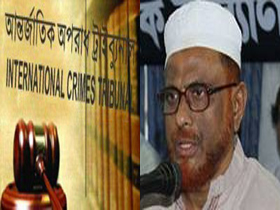The International Crimes Tribunal-1 on Tuesday expressed its dissatisfaction over the modus operandi of cross-examination by the defence counsel for war crimes accused ATM Azharul Islam, a Rangpur commander of 1971 Al Badr.
Pointing at defence counsel Abdus Sobhan Tarafder, the tribunal said: “You’re asking the prosecution witness a volley of questions. Bear in mind it’s a murder case under section 302 of the Penal Code.”
It also said: “You’re making efforts to create doubt about the place of occurrence- the aisle of a disputed land where the murder has taken place. You’re thinking that if the position of aisle can be diverted through questioning in detail in a bid to create a benefit of doubt, the accused would be acquitted.”
Besides, the tribunal said: “We’ve been observing that your method of putting questions like those of a typical case of civil in nature, which obviously requires time. But the war crimes case is quite different as it limits time in dispensation of justice.”
During the cross–examination, the defence counsel must concentrate within the statement made by the prosecution witness against the accused and the question and suggestion will be based on pertinent subject.
Meanwhile, freedom fighter prosecution witness (PW-4) M Meser Uddin, also a retired teacher of a Degree College, while facing cross-examination said that as a student leader of Jamaat (ICS), accused ATM Azharul Islam had made election campaign in Rangpur in favour of Jamaat-e-Islami candidate in the 1970 national election.
The PW told the tribunal that in 1971, by and large the people of Ramkrisnhapur in Badarganj, being scared, used to take refuge in Jharuarbeel after getting information of the arrival of the Pakistan occupation forces and their cohorts.
Replying to a defence suggestion, Meser said: “It’s not true that on April 16 in 1971, after alighting from a train at the rail gate No. 6, the Pakistan occupation forces along with Azharul and his cohorts did not carry out operation jointly at Dhappara killing 15 unarmed people, including a nine-month pregnant woman.
The PW told the tribunal that the following day on April 17, the people of six villages, including Ramkrishnapur, had taken refuge in Jharuarbeel before the genocide took place, perpetrated by the Pakistan occupation forces in collaboration with Azharul and his cohorts, killing over 1200 unarmed civilians, mostly the members of Hindu community.
The perpetrators had arrived earlier by two trains and advanced towards Jharuarbeel firing gunshots and burning down the houses on both sides of the road, said Meser, who had seen the incident from a nearby bush.
The tribunal adjourned the proceedings for March 23.
On November 12 last year, the tribunal dismissed the discharge plea filed by the accused and framed charges against ATM Azharul Islam, a commander of 1971 Al Badr, for his involvement in crimes against humanity, including genocide, during the Liberation War.
Also a leader of Jamaat-e-Islami, Azharul faces six counts of charges of crimes against humanity during the 1971 Liberation War like killing, abduction, confinement, torture, loot, arson, rape and genocide in Rangpur district.
A week after submitting the formal charge by the prosecution, the tribunal on July 25 took cognisance of the charge against the Jamaat-e-Islami assistant secretary general as it found a strong prima facie case against the accused under subsections 3(2) and 4(1) (2) of the International Crimes (Tribunals) Act 1973.
According to the prosecution case, Azharul, the then Islami Chhatra Sangha (ICS) president of Rangpur district unit, had been involved in the killing of more than 1,200 unarmed innocent civilians in Rangpur during the Liberation War in collaboration with the Pakistan occupation army and its auxiliary force like Al Badr.
It mentioned that Azharul Islam had played a key role in the killing of intellectuals, cultural personalities, physicians and lawyers in different areas of Rangpur during the 1971 war.
On August 22, 2012, police arrested Azharul from his Moghbazar house in the capital in connection with the war crimes case, hours after the tribunal issued a warrant for his arrest following a prosecution plea.
Source; UNBConnect










